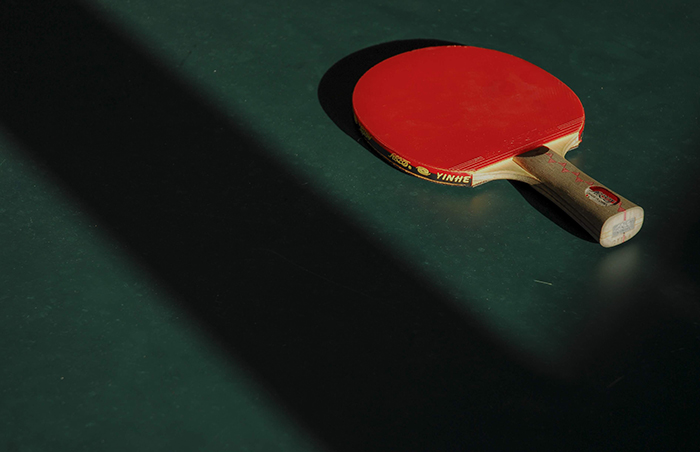“Jurisdictional Ping-Pong” in Patent Cases
In a forthcoming paper, Associate Professor Paul Gugliuzza offers a simpler rule for determining which court should take up a case.

When Boston University School of Law Associate Professor Paul R. Gugliuzza saw a February ruling from the US Court of Appeals for the Fifth Circuit in a long-running patent lawsuit involving the issue of exclusive jurisdiction—what the US Supreme Court has called “jurisdictional ping-pong”—he knew he had to write about the decision, which was emblematic of the complications that can arise under existing statutes and precedent.
In fact, the phrase “arise under” is part of the problem. Under applicable law, federal district courts have original jurisdiction over any case “arising under any act of Congress relating to patents” and the US Court of Appeals for the Federal Circuit has exclusive jurisdiction over any such case on appeal. But figuring out exactly what “arise under” means has vexed judges for years. The issue reached a boiling point when the Fifth Circuit, ruling in Xitronix v. KLA-Tencor, refused to accept a case from the Federal Circuit, writing that it was “implausible that we are the proper court to decide this appeal.”

“It’s basically a civil procedure exam hypothetical,” laughs Gugliuzza, who has crafted similar scenarios for his students’ tests.
Now, Gugliuzza, who worked on patent appeals when he was in practice at Jones Day, is tackling the issue for scholars and practitioners in “Rising Confusion About ‘Arising Under’ Jurisdiction in Patent Cases,” an article forthcoming in the Emory Law Journal. And he doesn’t just describe the problem; he also offers up a possible solution.
Some patent law claims—for infringement or invalidity—very clearly arise under patent law. But often patent law is tangential to an underlying state law claim, such as legal malpractice or breach of contract.
The question of which of those patent cases federal district courts and the Federal Circuit should hear has become a serious concern for judges and litigants alike. Patent cases are notoriously expensive and time consuming, and the issue of subject-matter jurisdiction can be raised at any time during litigation. In Xitronix, the parties are on their third appeal without a decision on the merits.
“It’s really important to get subject-matter jurisdiction right at the start of a case,” Gugliuzza says. “Dismissing a case after trial or on appeal can waste years of time and millions of dollars.”
Ultimately, those costs have implications for innovation.
“If litigation is too costly, that means it’s hard to enforce patents, which might discourage you from getting a patent in the first place, which then discourages innovation,” Gugliuzza says.
An expert in civil procedure and federal courts with a focus on patent litigation, Gugliuzza has studied the issue of exclusive jurisdiction for years. In 2013, he wrote “The Federal Circuit as a Federal Court,” which explored the Federal Circuit’s role in shaping patent-law doctrine. “Patent Law Federalism,” published in 2014, looked at whether the Federal Circuit is living up to its ascribed role of providing uniformity and expertise in patent matters. In its Xitronix ruling, the Fifth Circuit cited “Patent Law Federalism,” explaining in the accompanying footnote that, although it felt it had to send the case back to the Federal Circuit to preserve uniformity in patent law, not everyone agrees that the Federal Circuit provides such uniformity.
In his latest paper, Gugliuzza makes two arguments. In an ideal world, he says, federal jurisdiction over patent claims would be narrower to ensure state courts could weigh in on important non-patent related law. Once a patent-related claim is in federal court, however, Gugliuzza argues it makes sense for the Federal Circuit to hear any appeals so that it can apply its special expertise.
Until that ideal world exists, he lays out a clearer test for when federal district courts and the Federal Circuit should take the lead.
“For a case that does not involve claims of patent infringement to nevertheless arise under patent law, it must present a dispute about the content of federal patent law or a question about the interpretation or validity of the federal patent statute,” he writes in his paper.
Gugliuzza bases his argument in part on a 2013 US Supreme Court ruling, Gunn v. Minton, which held that the application of federal patent law is not enough to trigger exclusive jurisdiction in the federal courts. In that case, Chief Justice John G. Roberts Jr., comparing the state of case law on the topic to a painter’s canvas, wrote that “the canvas looks like one that Jackson Pollock got to first;” in his paper, Gugliuzza pitches his solution as “more like a Mark Rothko” (the artist was known for painting simple, colorful rectangles).
Gugliuzza says he hopes his article will be helpful for practitioners and judges.
“In my scholarship, I try to bring in insights that are useful—to blend in scholarly analysis with practical payoffs,” he says. “I love teaching the law. Obviously, a lot of that teaching is in class. But I think as scholars we can do a lot of teaching as well.”
Reported by Rebecca Beyer
Related News
- BU Law Professors Plan to Study Impact of Biopharmaceutical Funder CARB-X
- Housing, Employment, Family & Disability Clinic Student Wins Jury Trial
- Judge Richard M. Gergel Delivers 2019 Max M. Shapiro Lecture
